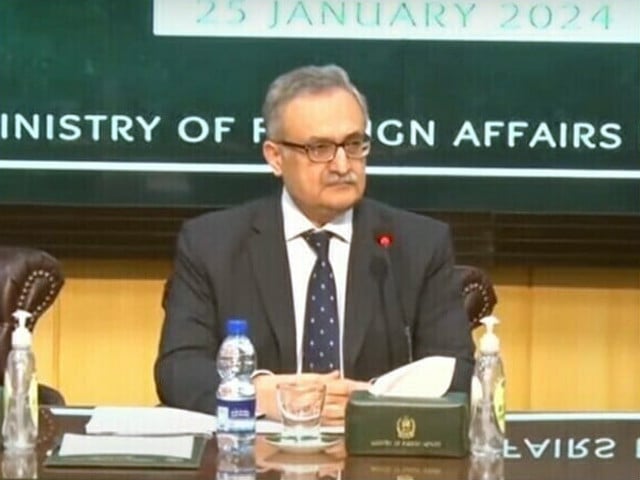
Pakistan has called for developing a clear and bold plan by the Muslim states to secure the implementation of the goals and objectives agreed upon by the Organization of Islamic Cooperation (OIC) leaders during last month's extraordinary OIC Executive Committee meeting in Saudi Arabia.
Foreign Secretary Syrus Sajjad Qazi, who led the Pakistani delegation at the 50th Session of the OIC Council of Foreign Ministers (CFM) in Yaounde, Cameroon, called for unity and resolve to address the challenges confronting the Ummah.
Addressing the two-day CFM, Qazi highlighted the oppressive foreign occupation of Palestine and Jammu and Kashmir and the conflicts across the world fuelled by endemic poverty, terrorist and extremist groups and external interventions.
He said that over 40,000 Palestinians, most of them women and children, had been martyred and nearly two million displaced by Israel's genocidal war in Gaza. "We must urgently secure an immediate and unconditional ceasefire in Gaza and the West Bank," he said.
He also called for ensuring unrestricted humanitarian aid to Gaza; preventing the spread of the conflict to the entire Middle East, while holding Israel accountable for its criminal assassinations and violation of the sovereignty and territorial integrity of Iran, Lebanon and other states.
The foreign secretary called for admitting Palestine as a full member State of the United Nations; and the establishment of a viable, secure, contiguous, and sovereign state of Palestine based on pre-1967 borders, with Al-Quds Al-Sharif as its capital, he said.
Highlighting the Kashmir dispute, he called for its resolution for durable peace in South Asia. He said that since August 5, 2019, India initiated unilateral steps to annex occupied Jammu and Kashmir and impose what India's leaders ominously called a "Final Situation" for Kashmir.
Reiterating Pakistan's rejection of all attempts to conduct any farcical "elections" in Indian Illegally Occupied Jammu and Kashmir (IIOJK), Qazi asked India to reverse its unilateral measures taken since 5 August 2019.
He warned that the situation in Kashmir posed an ever-present threat to regional and global peace and security. "Even a minor incident could trigger a wider conflict, which could escalate to dangerous dimensions. The international community cannot afford to ignore this threat any longer," he said.
He said that Islamophobia had emerged as a global crisis, marked by frequent desecration of the Holy Quran, attacks on mosques, negative stereotyping of Muslims and acts of discrimination and violence against them. He also urged the OIC to work collectively to combat all forms of terrorism.
Coming to the resurge of terrorism to threaten regional and global peace and security, he said Pakistan was the biggest victim of terrorism having contributed the most to fight terrorism.

1725523665-0/Minecraft-Movie-(1)1725523665-0-405x300.webp)



1732086766-0/BeFunky-collage-(74)1732086766-0-165x106.webp)
1732085354-0/insta-(1)1732085354-0-270x192.webp)











COMMENTS
Comments are moderated and generally will be posted if they are on-topic and not abusive.
For more information, please see our Comments FAQ